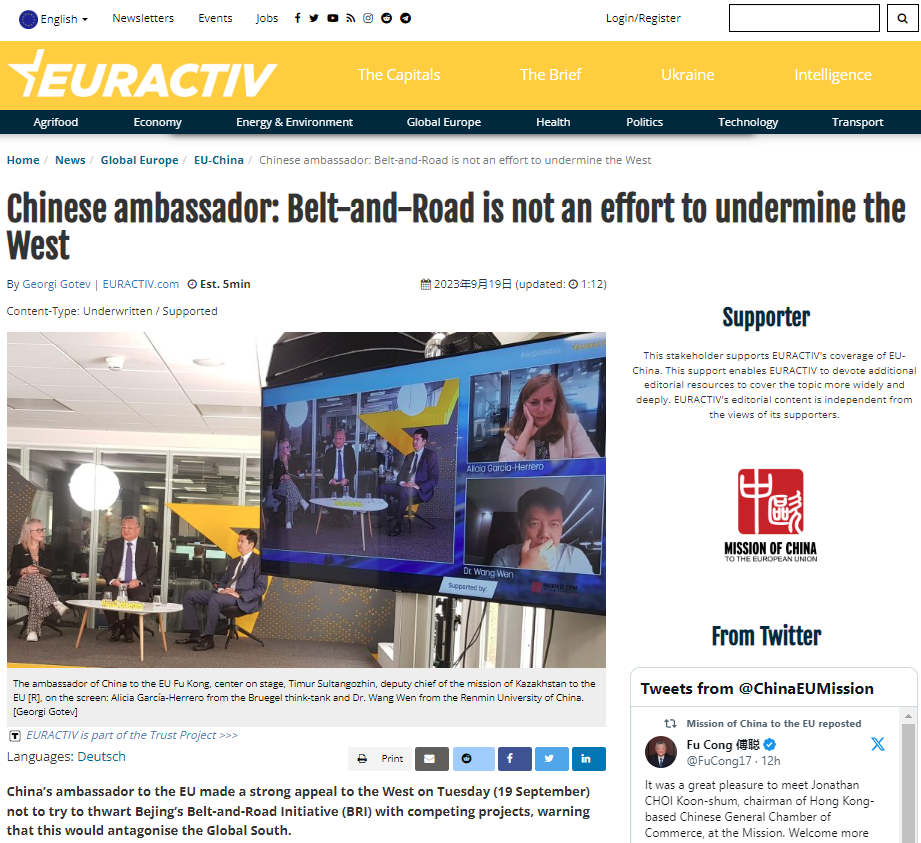LATEST INSIGHTS
Your Present Location: LATEST INSIGHTSWang Wen: Chinese ambassador: Belt-and-Road is not an effort to undermine the West
Source: EURACTIV PublishedL 2023-09-19

China’s ambassador to the EU made a strong appeal to the West on Tuesday (19 September) not to try to thwart Bejing’s Belt-and-Road Initiative (BRI) with competing projects, warning that this would antagonise the Global South.
Fu Cong was the keynote speaker at a conference organised by EURACTIV with the financial support of his embassy, dedicated to the 10th anniversary of Belt-and-Road, the global infrastructure development strategy adopted by the Chinese government in 2013.
The diplomat highlighted the historic roots of the initiative, which builds on the Silk Road, the network of Eurasian trade routes active from the second century BC until the mid-15th century. BRI was first officially announced during the visit of President Xi Jinping to Kazakhstan in 2013.
The anniversary, the diplomat said, was a good opportunity to look back but also look ahead.
In 2019, the EU took the decision not to join BRI as a whole, although individual member states were free to take part. Most Western governments have tended to view BRI as a means to spread Chinese influence abroad while saddling poor countries with unsustainable debt.
Italian Defence Minister Guido Crosetto recently called “atrocious” his country’s decision to join BRI, which multiplied China’s exports to Italy but did not have the same effect on Italian exports to China. Italy signed up to the BRI under a previous government, the only major Western country to have taken such a step.
In the meantime the EU came up with its own Global gateway initiative, largely seen as a riposte to China’s BRI.
Fu gave an all-positive assessment of BRI, calling it “a road of opportunity and of prosperity”, saying that his country had under BRI signed more than 200 cooperation documents with over 150 countries, covering some 3,000 projects of nearly one trillion-dollar value.
He said BRI had contributed to creating 420,000 local jobs for participating countries and lifted 40 million people out of poverty.
In Europe, he highlighted as flagship BRI successes China’s acquisition of the Greek port of Piraeus, the Belgrade-Budapest railway, and the Peljesac bridge in Croatia. He argued that BRI and Global Gateway are not incompatible and stressed that “green is the most distinctive colour of BRI”, indirectly rejecting views that the Chinese initiative was not climate-friendly.
Timur Sultangozhin, deputy chief of the mission of Kazakhstan to the EU, spoke of his country’s positive experience with BRI, highlighting in particular the so-called “Middle Corridor” linking China to the EU.
Alicia García-Herrero from the Bruegel think-tank said their researchers had initially found that the project had the potential to increase international trade by 6% but also warned that the EU would be a loser if China created a free trade zone along the Belt-and-Road.
COVID and the war in Ukraine had an impact on BRI, which she said changed its nature from economic projects toward security – “soft – and one day – hard power initiatives”.
‘We can do better’
Dr. Wang Wen from the Renmin University of China said that according to his research, the Chinese initiative had inspired more than 3,000 Western studies. He insisted that in the Chinese view, such initiatives should be complementary.
Asked about scepticism in the EU about BRI, the Chinese ambassador said he hoped the sentiment toward BRI in the West would improve as the initiative enters its second decade.
He described BRI in the following terms: “China never imposes any project on any country– it’s always the country that comes up with the project, and China comes up with the assistance.”
He admitted that China’s soft power was increasing as projects multiplied, but added that his country’s objective was to engage with the respective country “on an equal footing” and in “a courteous manner”.
“We don’t pretend to be the saviours of the world. Chinese companies are going there for their own purposes, for their own benefits. But at the same time, we bring benefits for the local people,” the ambassador said.
In his closing remarks, the diplomat insisted that BRI was not a Chinese effort to undermine the West, and urged it not to design its initiatives against BRI.
“I don’t think that would be welcome by the other part of the world, by the Global South”, he said.
China will host a ‘Belt and Road Forum for International Cooperation’ in Beijing this October.
Key Words: BRI, EU, Wang Wen, Global South























































































 京公网安备 11010802037854号
京公网安备 11010802037854号





